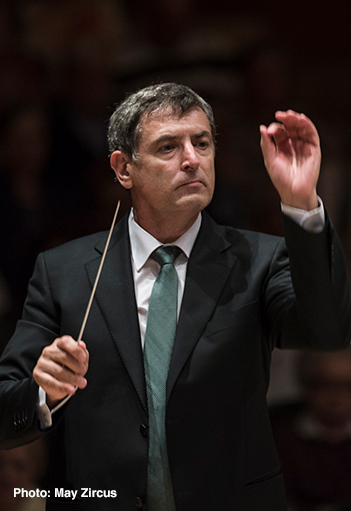Emili Pascual Carbonell was born in Llíria, Valencia, where he was taught by Miguel Correa and Vicente Martí. He also studied with Emanuel Abbuhl and Omar Zaboli at the MusikAkademie in Basel. He is founder of the Harmonia wind quintet and the Ensemble Eufonía and has been a soloist with some of the most prominent Spanish orchestras. Emili Pascual Carbonell was repertory professor at the Academia del Liceu and has led masterclasses at the Escola Superior de Música de Catalunya.
Emili Pascual Carbonell joined the Symphony Orchestra of the Gran Teatre del Liceu at 18 years of age and has been oboe soloist there for the last 32 years, in 2012 expanding his rôle to include that of English horn soloist.
Ferran Armengol studied classical percussion with teachers including Xavier Sigfried Fink, Gary Burton and Tony Campbell. He has worked with the Barcelona Symphony and Catalonia National Orchestras, the Barcelona Symphonic Band, and also with various chamber groups. He is currently percussionist with the Symphony Orchestra of the Gran Teatre del Liceu.
In 2000 he won the ‘Cuidad de Barcelona de Música’ prize for his work with the ensemble Bcn216 on the soundtrack of the film Metropolis (with music by Martin Matalon). He has also recorded the complete works of Roberto Gerhard with the same ensemble.

Salvador Brotons was born in Barcelona. He studied flute with his father, continuing his education additionally in composition and orchestral conducting at the Conservatori Superior de Música de Barcelona. In 1985 he was awarded a Fulbright scholarship and subsequently studied for a doctorate in music at Florida State University.
Brotons has written more than 130 works, and has received 16 prizes for composition, including the Premio Nacional de España (1977), the Premi Ciutat de Barcelona (1986) and the Queen Sofía Composition Prize (1991). He has also received numerous commissions and his works have been released on labels such as EMI, Auvidis, Albany Records and Naxos.
He has been music director of the Vancouver Symphony Orchestra since 1991, and has also been the conductor of the Vallès and Balearic Symphony orchestras. In 2002 he received the Florida State University Alumni Award for his professional achievements. He has been the music director of the Barcelona Symphonic Band since September 2008.
Osias Wilenski was born in Buenos Aires, Argentina, in 1933, the son of a Polish father and a Russian mother. From an early age he studied piano with Professor Vicente Scaramuzza and harmony, counterpoint and composition with Erwin Leuchter (himself a pupil of Alban Berg). From him stemmed an early interest in 12-tone music. During the ’50s and with the help of pianist Arthur Rubinstein, Wilenski won a scholarship to The Juilliard School of Music in New York, where he resided for several years. There, he studied composition with William Bergsma, William Schuman and Vincent Persichetti. He was also the only private piano pupil of virtuoso Simon Barere, and performed in New York’s Hunter College and Town Hall.
When back in Argentina he continued his piano tours but in 1960 decided that this was not his real vocation and abandoned music to dedicate himself to a career in cinema and television. During this time he produced several short films. Moto Perpetuo won first prize at the Mar del Plata film festival, and Ramon Gomez de la Serna, about the house of the famous Spanish writer, won the short film prize at the San Sebastian Film Festival in Spain. Osias Wilenski also produced and directed two feature films, the l962 El Perseguidor, based on a short story by Julio Cortazar and Dale Nomás (l966) a film made up of sketches.
In 1975, after several years of directing the newly opened television channel Canal 13, he went back to music, taking up a position as piano tutor at the Teatro Colón in Buenos Aires. He also returned to his work as a composer. He destroyed many of his youthful works, but rewrote others and slowly, these came to be known and performed.
In 1978 he was awarded the ‘Ensemblia’ first prize from the Buenos Aires Symphony Orchestra for his work Improvisos. In 1983 he won the first prize from the ‘Asociación Wagneriana’ for his work La Leyenda del Kakuy, a musical poem for six instruments, based on an Indian legend from a central province of Argentina. In 1989, partly because of the inflammatory situation in Argentina, but also because of a contract to work as principal pianist at the Gran Teatre del Liceu in Barcelona, he left his native country and emigrated to Spain where he still lives in Barcelona, and has adopted Spanish nationality.
The most active and fertile years of Wilenski’s compositional career came after 1990. The catalogue of his works includes five string quartets, songs, chamber works, three piano sonatas and shorter piano works, a symphony for large orchestra and a second one for symphonic band, to be premièred during 2015.
In 2007 Wilenski begun a series of recordings featuring his piano and chamber works, all of which are composer-performed or supervised. These recordings were made for Parma Recordings in the USA and Columna Music in Spain. This recording is his first on the Naxos label.






























